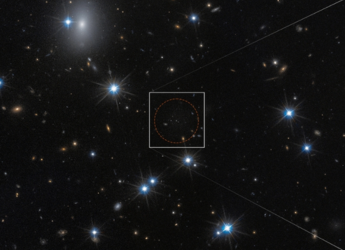- Home
- Science
- Science News
- NASA Announces Two New Missions to Venus, to Launch at the End of Decade
NASA Announces Two New Missions to Venus, to Launch at the End of Decade
NASA said, "They will offer the entire science community the chance to investigate a planet we haven't been to in more than 30 years."

Photo Credit: NASA/JPL-Caltech
Venus hides a wealth of information that could help us better understand Earth and exoplanets
NASA announced two new missions to Venus on Wednesday that will launch at the end of the decade and are aimed at learning how Earth's nearest planetary neighbour became a hellscape while our own thrived.
"These two sister missions both aim to understand how Venus became an inferno-like world, capable of melting lead at the surface," said Bill Nelson, the agency's newly-confirmed administrator.
"They will offer the entire science community the chance to investigate a planet we haven't been to in more than 30 years."
In today's #StateOfNASA address, we announced two new @NASASolarSystem missions to study the planet Venus, which we haven't visited in over 30 years! DAVINCI+ will analyze Venus' atmosphere, and VERITAS will map Venus' surface. pic.twitter.com/yC5Etbpgb8
— NASA (@NASA) June 2, 2021
The missions have been awarded about $500 million (roughly Rs. 3,650 crores) under NASA's Discovery Program, and each is expected to launch in the 2028-2030 timeframe.
Both missions were picked from a competitive, peer-reviewed process based on their scientific value and feasibility of their plans.
DAVINCI+, which stands for Deep Atmosphere Venus Investigation of Noble gases, Chemistry, and Imaging, will gather more detail on the composition of Venus' primarily carbon dioxide atmosphere, to learn how it formed and evolved.
The mission also seeks to determine whether the planet once had an ocean.
A descent sphere will plunge through the dense atmosphere which is laced with sulfuric acid clouds.
It will precisely measure the levels of noble gases and other elements to learn what gave rise to the runaway greenhouse effect we see today.
DAVINCI+ will also beam back the first high resolution images of the planet's "tesserae," geological features roughly comparable with Earth's continents whose existence suggests Venus has plate tectonics.
The results could reshape scientists' understanding of terrestrial planet formation.
The other mission is called VERITAS, an acronym for Venus Emissivity, Radio Science, InSAR, Topography, and Spectroscopy.
This will aim to map the Venusian surface from orbit and delve into the planet's geologic history.
Using a form of radar that is used to create three-dimensional constructions, it will chart surface elevations and confirm whether volcanoes and earthquakes are still happening on the planet.
It will also use infrared scanning to determine rock type, which is largely unknown, and whether active volcanoes are releasing water vapor into the atmosphere.
While the mission is NASA led, the German Aerospace Center will provide the infrared mapper, while the Italian Space Agency and France's Centre National d'Etudes Spatiales will contribute to the radar and other parts of the mission.
"It is astounding how little we know about Venus, but the combined results of these missions will tell us about the planet from the clouds in its sky through the volcanoes on its surface all the way down to its very core," said Tom Wagner, NASA's Discovery Program scientist.
"It will be as if we have rediscovered the planet."
NASA's last Venus orbiter was Magellan, which arrived in 1990, but other vessels have made fly-bys since then.
Get your daily dose of tech news, reviews, and insights, in under 80 characters on Gadgets 360 Turbo. Connect with fellow tech lovers on our Forum. Follow us on X, Facebook, WhatsApp, Threads and Google News for instant updates. Catch all the action on our YouTube channel.
Related Stories
- Samsung Galaxy Unpacked 2026
- iPhone 17 Pro Max
- ChatGPT
- iOS 26
- Laptop Under 50000
- Smartwatch Under 10000
- Apple Vision Pro
- Oneplus 12
- OnePlus Nord CE 3 Lite 5G
- iPhone 13
- Xiaomi 14 Pro
- Oppo Find N3
- Tecno Spark Go (2023)
- Realme V30
- Best Phones Under 25000
- Samsung Galaxy S24 Series
- Cryptocurrency
- iQoo 12
- Samsung Galaxy S24 Ultra
- Giottus
- Samsung Galaxy Z Flip 5
- Apple 'Scary Fast'
- Housefull 5
- GoPro Hero 12 Black Review
- Invincible Season 2
- JioGlass
- HD Ready TV
- Latest Mobile Phones
- Compare Phones
- Realme P4 Lite
- Vivo V70
- Vivo V70 Elite
- Google Pixel 10a
- Tecno Camon 50
- Tecno Camon 50 Pro
- Lava Bold N2
- Vivo V60 Lite 4G
- Asus Vivobook 16 (M1605NAQ)
- Asus Vivobook 15 (2026)
- Infinix Xpad 30E
- Brave Ark 2-in-1
- Amazfit T-Rex Ultra 2
- boAt Chrome Iris
- Xiaomi QLED TV X Pro 75
- Haier H5E Series
- Asus ROG Ally
- Nintendo Switch Lite
- Haier 1.6 Ton 5 Star Inverter Split AC (HSU19G-MZAID5BN-INV)
- Haier 1.6 Ton 5 Star Inverter Split AC (HSU19G-MZAIM5BN-INV)






![[Partner Content] OPPO Reno15 Series: AI Portrait Camera, Popout and First Compact Reno](https://www.gadgets360.com/static/mobile/images/spacer.png)








